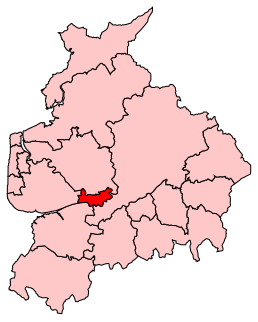
The 1945 United Kingdom general election was a national election held on 5 July 1945, but polling in some constituencies was delayed by some days, and the counting of votes was delayed until 26 July to provide time for overseas votes to be brought to Britain. The governing Conservative Party sought to maintain its position in Parliament but faced challenges from public opinion about the future of the United Kingdom in the post-war period. British Prime Minister Winston Churchill proposed to call for a general election in Parliament, which passed with a majority vote less than two months after the conclusion of the Second World War in Europe.

Arthur Greenwood, was a British politician. A prominent member of the Labour Party from the 1920s until the late 1940s, Greenwood rose to prominence within the party as secretary of its research department from 1920 and served as Parliamentary Secretary to the Ministry of Health in the short-lived Labour government of 1924. In 1940, he was instrumental in resolving that Britain would continue fighting Nazi Germany in World War II.

Blackburn is a constituency which has been represented in the House of Commons of the UK Parliament since 2015 by Kate Hollern of the Labour Party. From 1979 to 2015, it was represented by Jack Straw who served under the Labour leaders of Neil Kinnock and John Smith and the Labour governments of Tony Blair and Gordon Brown.

Preston is a constituency represented in the House of Commons of the UK Parliament since 2000 by Sir Mark Hendrick, a member of the Labour Party and Co-operative Party.
The Preston by-election, 1946 was a parliamentary by-election held on 31 January 1946 for the British House of Commons constituency of Preston in Lancashire. The seat had become vacant when the Labour Member of Parliament John Sunderland had died on 24 November 1945. Sunderland had held the seat since the 1945 general election.
The Croydon North by-election, 1940 was a parliamentary by-election held in the British House of Commons constituency of Croydon North on 19 June 1940. The seat had become vacant when the Conservative Member of Parliament Glyn Mason had resigned. Mason had held the seat since the 1922 general election.
The Nottingham Central by-election, 1940 was a parliamentary by-election held for the British House of Commons constituency of Nottingham Central on 19 July 1940. The seat had become vacant when the Conservative Member of Parliament (MP) Sir Terence O'Connor had died on 7 May 1940. O'Connor had held the seat since a by-election in 1930.
The Cheltenham by-election, 1928 was a parliamentary by-election held on 26 September 1928 for the British House of Commons constituency of Cheltenham in Gloucestershire.
The Cheltenham by-election, 1937 was a parliamentary by-election held on 22 June 1937 for the British House of Commons constituency of Cheltenham in Gloucestershire.
The 1940 Kettering by-election was a parliamentary by-election held on 6 March 1940 for the British House of Commons constituency of Kettering in Northamptonshire.
The Newcastle upon Tyne North by-election, 1940 was a parliamentary by-election held on 7 June 1940 for the British House of Commons constituency of Newcastle upon Tyne North.
The Spennymoor by-election, 1942 was a parliamentary by-election held on 21 July 1942 for the British House of Commons constituency of Spennymoor in County Durham.
The Rochdale by-election, 1940 was a by-election held for the British House of Commons constituency of Rochdale in Lancashire on 20 July 1940.
Adrian Charles Moreing was a British Conservative Party politician.
The Preston by-election, 1936 was a parliamentary by-election held for the British House of Commons constituency of Preston on 25 November 1936. The seat had become vacant when the Conservative Member of Parliament William Kirkpatrick had resigned to take up the post of representative to China of the Export Credits Guarantee Department.
The Birmingham Edgbaston by-election, 1940 was a parliamentary by-election held for the British House of Commons constituency of Birmingham Edgbaston on 18 December 1940. The seat had become vacant when Neville Chamberlain, the constituency's Conservative Party Member of Parliament had died from stomach cancer on 9 November. Chamberlain had been Prime Minister until May 1940, and had held the Edgbaston seat since the 1929 general election.
The Clitheroe by-election, 1979 was a by-election held for the British House of Commons constituency of Clitheroe in Lancashire on 1 March 1979. It was won by the Conservative Party candidate David Waddington.
The Liverpool Wavertree by-election, 1935 was a by-election held in England for the House of Commons constituency of Liverpool Wavertree on 6 February 1935. It was won by the Labour Party candidate Joseph Cleary.
The Battersea North by-election, 1940 was a parliamentary by-election held on 17 April 1940 for the British House of Commons constituency of Battersea North in the Metropolitan Borough of Battersea.
The Preston by-election, 1929 was a parliamentary by-election held in England for the House of Commons constituency of Preston on 31 July 1929. The seat had become vacant when the Liberal Member of Parliament William Jowitt had resigned his seat after changing his party allegiance.
This page is based on this
Wikipedia article Text is available under the
CC BY-SA 4.0 license; additional terms may apply.
Images, videos and audio are available under their respective licenses.



